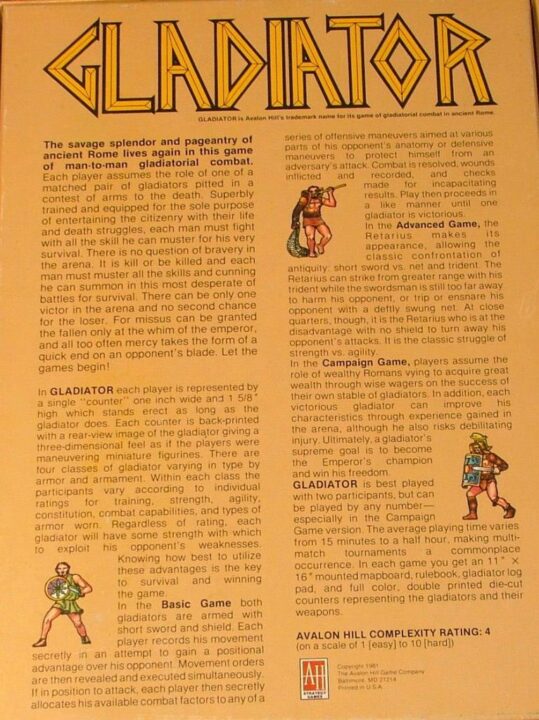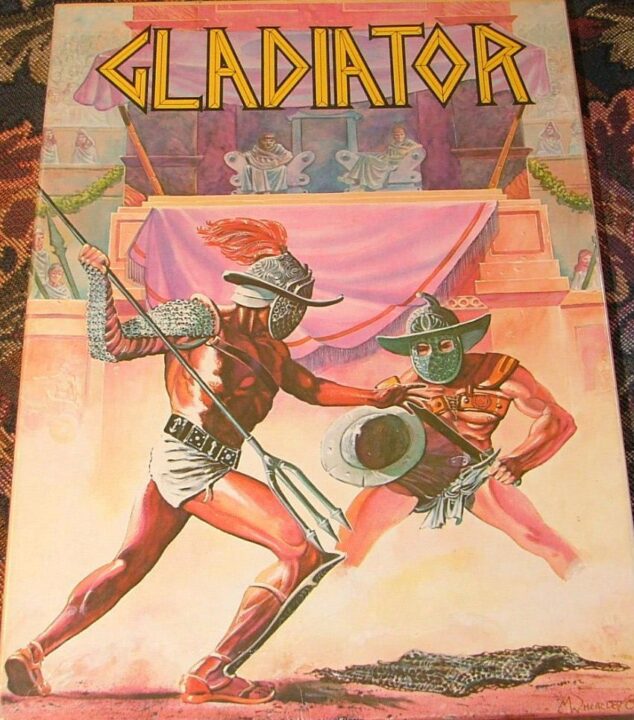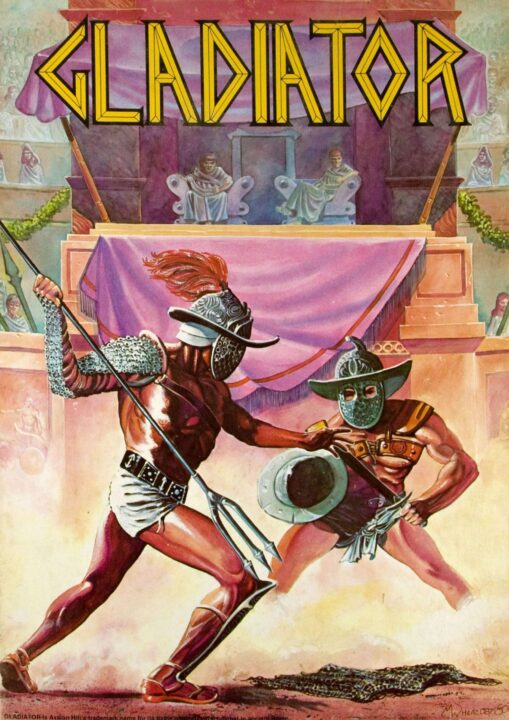So, my neighbor Dave thought it’d be a good idea to see who among us would survive the Colosseum. Not literally, thank goodness, but with the board game Gladiator, which I’m reviewing today. Between sword-swinging drama and who-ate-the-most-chips distractions, our group put this game through its paces. If you want to know if this is more clever dueling or dice-rolling chaos, you’re in the right place. Grab your plastic shield and read on!
How It Plays
Setting up
Gather your friends—preferably the ones who won’t throw a fit when they lose! Each player picks a gladiator board and matching tokens. Shuffle the event cards, sort the weapons, and plonk the arena in the middle. Everyone grabs some coins and health markers. Bragging beforehand is optional, but recommended.
Gameplay
Each turn, you train, grab weapons, and try to make your fighter look cooler than your mate’s. Then you battle it out in the arena, using action cards and dice to slash and bash. There’s scheming, bluffing, and, if you’re me, dramatic fake sword noises. Events pop up to spice things up—sometimes rocks, sometimes lions, sometimes just pure chaos.
Winning the game
After all the dust, sweat, and dice have settled, the player with the most fame points wins. If you’re lucky, you get to call your friends “pathetic worms” in your best Russell Crowe voice. That’s not official, but it should be.
Want to know more? Read our extensive strategy guide for Gladiator.
Combat System and Player Interaction in Gladiator: Who Will Wear the Laurel Wreath?
I have to say, the combat system in Gladiator had my friends and I shouting, giggling, and occasionally fake-wounding ourselves with the rulebook. The heart of the game is in the battles – and let me tell you, the designers wanted to make sure you felt every sweaty, sand-kicking moment. Each player takes control of a gladiator, and the action spills out like an over-enthusiastic pizza delivery guy. There’s movement, posturing, and, of course, some brutal dice rolling.
Now, the system itself uses a mix of action points and simple dice checks. Every move and counter, every shield parry or risky lunge, costs you something, so planning matters. You can’t just leap around the arena like a caffeinated gazelle – trust me, Steve tried, and now we call him “Gazelle Steve” whenever he lands his dice on the floor. The combat’s got a bit of that old-school chess feeling: make a wrong move and someone’s poking you with a trident.
But what really made me grin was the player interaction. This isn’t one of those games where you stare at your own little world and occasionally nod at the person next to you. Every fight is a show for the whole table. You’ll see secret alliances form just long enough to backstab, trash talk that escalates into full-on drama, and wild gambles when someone bets it all on a single attack. Sure, sometimes the dice have moods, and you’ll curse your luck, but overall, your clever plays matter more than your dice karma.
Speaking of luck, next up I’ll spill the beans on that endless struggle: does Gladiator reward skill or leave you at the mercy of cruel Fortuna? Stay tuned, because this is where things get real!

Balance Between Skill and Luck in Gladiator
Alright, let me lay this out: Gladiator is a board game that promises glory in the arena, but does it reward skill, or will the gods of randomness squash your dreams like a grape? I’ve played this with my usual crew—the kind of friends who can spot an unfair rule from a mile away. To my relief, Gladiator mostly lets your brain and not just your dice-rolling biceps win the day.
Now, a big part of Gladiator is plotting your moves and reading your rivals. The card combos and special abilities you pick make your style. But, and here’s a real twist, there are still dice for attacks and defenses. One time, my friend Dave had an unbeatable tactic, but then he rolled three ones in a row. If you like your victories a little spicy, you’ll enjoy it, but if you’re allergic to luck, it can sting.
The game tries to balance this by giving you tactical cards and choices. If you plan well, you can tip the odds your way, but nobody can laugh in the face of fate forever—sometimes the dice just say “nope.” For me, it’s not perfect, but the mix of skill and luck feels just about fair. It’s no chess, but it’s way smarter than most ‘roll and hope’ games out there.
If you want a game where clever thinking counts, Gladiator mostly delivers, but expect an occasional bad-luck slap across the face. Next up, we’re looking at replay value and game variety—because who wants to buy a game that’s about as fun the second time as a wet sock?

Gladiator’s Replay Value and Game Variety: Will You Return to the Arena?
I can’t even count how many times my friends and I have shouted, “For glory!” across the table while playing Gladiator. That’s already a good sign for replay value if you ask me. The game doesn’t just copy the same round over and over. Each match feels unique, which is amazing for a game where you bash plastic warriors together in the Colosseum.
Every session, you get to try different Gladiators with their own special powers. Sometimes you go all in as a lumbering tank, hoping to outlast everyone. Other times, I pick the sly, speedy fighter who insists on trash talking even when losing (which is often, sadly). The special weapons and events add surprise chaos, but not the kind that makes the game feel rigged or repetitive. You never know if you’ll end up fighting with a net or get chased by a rogue lion. The tactics always shift!
One thing I liked: You can mix up the number of players—three is tense, but with five it’s pure mayhem. The arena can also change with modular rules, and there are mini campaigns for those with gladiatorial ambitions lasting more than a single night. Sure, if you only play with one group, the jokes might run thin after a while. But hey, that just means it’s time to force your cousin Steve to stop lurking in the kitchen and join in.
If you’re curious whether Gladiator’s swords-and-sandals theme looks as good as it plays, stay tuned, because next I’m going to spill the beans on component quality and how immersive the whole thing feels!
Gladiator Board Game: Component Quality & Theme Immersion Review
Alright, let’s talk about what you get in the box—and trust me, it’s not just a pile of sad tokens and one scuffed die. Gladiator comes packed with chunky cards, decent little miniatures (seriously, one of them looks like my plumber Ray if he decided to dress up as a centurion), and a board that actually fits on your table. That already puts it ahead of half the games in my closet, which are so big they need their own zip code.
The art is top notch. The cards are full of dramatic poses—one dude is flexing so hard I think I pulled a muscle just looking at it. The whole thing shouts Rome, sand, and maybe some theme music from a certain Russell Crowe movie. The only letdown is the player boards. They’re a bit, well, flimsier than I wanted. After three rounds, my buddy Greg had already spilled salsa on his, and that poor gladiator looked like he was bleeding from his neck.
Now, for theme. Gladiator nails it. You want backstabbing? It’s here. You want to cheer (or boo) as a friend rolls terribly and gets clobbered? That’s pretty much every round. I caught myself holding my breath before a big hit, then laughing as my ‘unbeatable’ fighter tripped over his own feet and lost to a rookie. It pulls you in, and even my non-gamer friends started shouting in fake Latin. Ok, mostly swear words. But still, it felt real!
Would I recommend Gladiator? Absolutely, if you want a fun, rowdy fight night in a box. Just don’t be surprised if your table ends up covered in salsa and fake bravado.
Conclusion
Well, that wraps up my review of Gladiator. After several epic battles and some not-so-epic defeats (never trust your best friend with a net), I can say this game brings loads of action and laughs to the table. The tactical fights, unique characters, and strong theme make it a blast, especially if you like a mix of planning and surprises. The components look good, but those flimsy player boards could use a shield or two. Luck plays a role, but it’s not a total dice-fest. If you want a fast-paced scrap where skills matter and grudges are formed, Gladiator will be right at home in your game night lineup. Just… watch your back!


